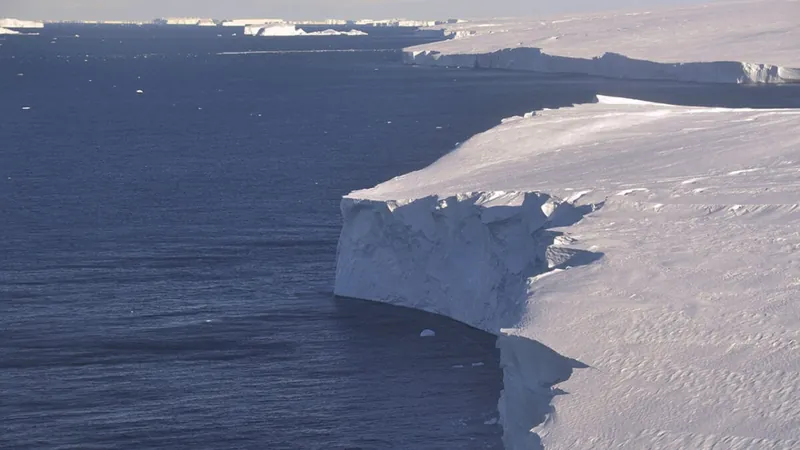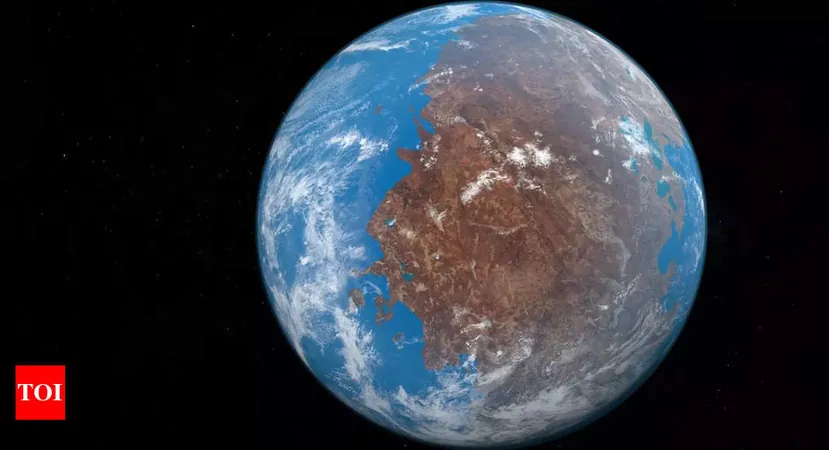
Is the 'Doomsday' Glacier About to Collapse? Discover the Controversial Solutions Scientists Are Considering!
2024-10-30
Author: Li
New research on the Thwaites Glacier, often ominously dubbed the "Doomsday Glacier," is stirring urgent discussions on the need for geoengineering as a potential solution to climate change.
Recent studies reveal that warming tidal currents are significantly accelerating the melting of Thwaites Glacier, which poses a severe risk to global sea levels. A May study led by scientists from the University of California, Irvine, and the University of Waterloo indicates that the glacier's retreat is far quicker than climate models have forecasted. Meanwhile, a separate August study from Dartmouth College and the University of Edinburgh suggests that Thwaites may not be as unstable and prone to collapse as once feared.
The Thwaites Glacier: A Ticking Time Bomb
The Thwaites Glacier is part of the West Antarctic Ice Sheet (WAIS), a massive expanse of ice that has a critical role in maintaining global sea levels. If this glacier were to breach, it could unleash a catastrophic sea level rise of nearly 11 feet, threatening coastal cities and small island nations around the world. The Thwaites Glacier currently contributes to about 4% of sea level rise, losing an alarming 50 billion tons of ice each year. Scientists warn that we may be approaching a tipping point—a critical threshold beyond which changes could result in irreversible damage to our climate, potentially endangering millions.
Dr. Christine Dow, an associate professor of glaciology, highlights the urgency of understanding these accelerated melting processes. "We were hoping it would take 100, maybe even 500 years to lose that ice. A major concern is if it happens much faster than that," she explained.
A Silver Lining? Improved Understanding of Stability
While the dangers surrounding the Thwaites Glacier are indeed alarming, the August study brings some perspective by suggesting that the glacier is less vulnerable to a phenomenon known as marine ice cliff instability (MICI) than previously assumed. MICI refers to the instability of tall ice cliffs that retreat rapidly and collapse into the ocean. The findings indicate that as the glacier thins, it might actually reduce the rate at which ice breaks off, calling for improved models to predict the glacier's behavior more accurately.
Geoengineering: The Bold Response to a Looming Crisis
As urgency mounts over the Thwaites Glacier's fate, some scientists are looking toward geoengineering—a controversial practice involving the manipulation of the environment to slow glacier melt—as a possible solution. A report from a group of glaciologists at the University of Chicago argues that research into glacier geoengineering must begin immediately. "It will take 15 to 30 years for us to understand enough to recommend or rule out any interventions," says John Moore, a co-author of the report, emphasizing the urgency of starting this research now.
Ideas under consideration range from the practical to the radical, such as erecting giant underwater barriers designed to block warm tidal currents from reaching glacier ice. These barriers could potentially extend the lifespan of glaciers like Thwaites, buying humanity crucial time.
The Great Debate: Is Geoengineering the Answer?
While glacial geoengineering could offer a lifeline under certain conditions, it remains contentious. Critics argue that these technological fixes could detract attention from the urgent need to reduce carbon emissions and that many such ideas could prove impractical or impossible.
Yet, some experts argue that discussions of geoengineering could serve as a wake-up call, prompting more serious action against carbon emissions. Gernot Wagner, a climate economist, notes that while geoengineering is not a cure-all, it may act as a "painkiller" that allows society to manage immediate risks while addressing the deeper issues of climate change.
In summary, as we inch closer to significant climate tipping points like the melting Thwaites Glacier, experts emphasize that geoengineering may offer valuable options—but it should not be viewed as a comprehensive solution. "Geoengineering is not a solution to climate change," Wagner asserts. "We must seize the opportunity it provides to address emissions before the worst-case scenarios become inevitable."
Stay tuned as this critical story unfolds and the world grapples with the potential consequences of losing the Thwaites Glacier to climate change!



 Brasil (PT)
Brasil (PT)
 Canada (EN)
Canada (EN)
 Chile (ES)
Chile (ES)
 España (ES)
España (ES)
 France (FR)
France (FR)
 Hong Kong (EN)
Hong Kong (EN)
 Italia (IT)
Italia (IT)
 日本 (JA)
日本 (JA)
 Magyarország (HU)
Magyarország (HU)
 Norge (NO)
Norge (NO)
 Polska (PL)
Polska (PL)
 Schweiz (DE)
Schweiz (DE)
 Singapore (EN)
Singapore (EN)
 Sverige (SV)
Sverige (SV)
 Suomi (FI)
Suomi (FI)
 Türkiye (TR)
Türkiye (TR)